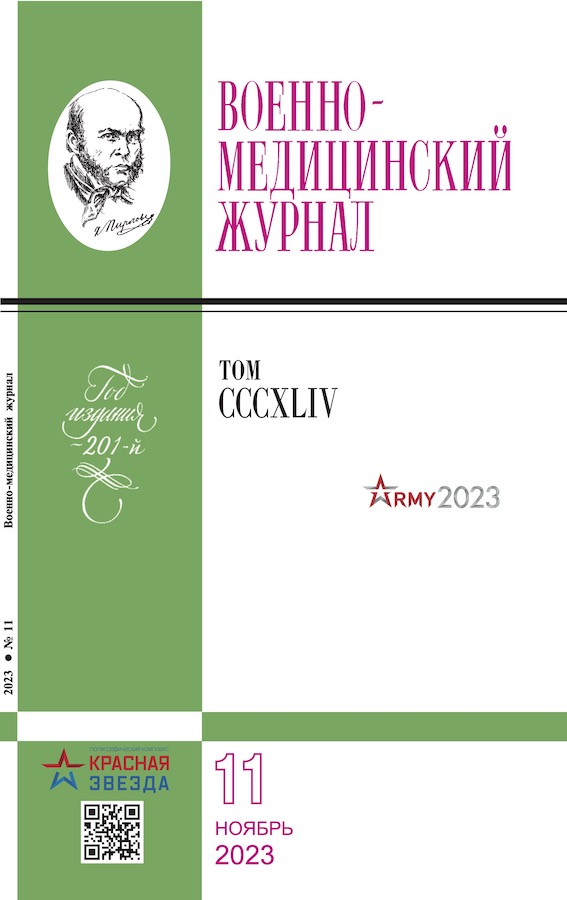Features of the course of the new coronavirus infection in children - students of the cadet corps of the Russian Ministry of Defense.
- Authors: Meshkov A.V.1, Doroshina E.A.1, Nikiforova T.Y.1, Koldina O.N.1, Gazizova L.R.1, Serikova L.S.2
-
Affiliations:
- Branch No. 1 of the National Medical Research Center – The A.A.Vishnevsky Central Military Clinical Hospital of the Ministry of Defense of the Russian Federation
- National Medical Research Center – The A.A.Vishnevsky Central Military Clinical Hospital of the Ministry of Defense of the Russian Federation
- Issue: Vol 344, No 11 (2023)
- Pages: 65-67
- Section: Brief articles
- URL: https://journals.eco-vector.com/0026-9050/article/view/631164
- DOI: https://doi.org/10.52424/00269050_2023_344_11_65
- ID: 631164
Cite item
Abstract
The purpose of the study was to assess the clinical and laboratory features of the course of COVID-19 in children hospitalized in the pediatric department during different periods of the pandemic. 515 case histories, 170 medical records of pupils of the boarding school of the Ministry of Defense were analyzed. It assessed clinical and laboratory parameters in different periods of the pandemic associated with various variants of the SARS-CoV-2 virus. The primary groups were formed according to the criteria for a clinically pronounced course of coronavirus infection, asymptomatic COVID-19 and the number of cases of COVID-19 during the pandemic period. Because of the analysis of 101 child development maps, the dominant groups of children with complaints after suffering COVID-19 in the form of post-covid syndrome were identified. The results of vaccination «Gam-covid-vac M» among teenage girls of the boarding house are presented. Despite the predominantly mild course of this disease in children, post-COVID syndrome is common, which significantly worsens the well-being and health of children. Timely examination and detection of post-COVID syndrome will allow choosing a personalized approach to its correction.
Full Text
About the authors
A. V. Meshkov
Branch No. 1 of the National Medical Research Center – The A.A.Vishnevsky Central Military Clinical Hospital of the Ministry of Defense of the Russian Federation
Author for correspondence.
Email: elenadoroshina1@mail.ru
Russian Federation, Krasnogorsk, Moscow region
E. A. Doroshina
Branch No. 1 of the National Medical Research Center – The A.A.Vishnevsky Central Military Clinical Hospital of the Ministry of Defense of the Russian Federation
Email: elenadoroshina1@mail.ru
Russian Federation, Krasnogorsk, Moscow region
T. Yu. Nikiforova
Branch No. 1 of the National Medical Research Center – The A.A.Vishnevsky Central Military Clinical Hospital of the Ministry of Defense of the Russian Federation
Email: elenadoroshina1@mail.ru
Russian Federation, Krasnogorsk, Moscow region
O. N. Koldina
Branch No. 1 of the National Medical Research Center – The A.A.Vishnevsky Central Military Clinical Hospital of the Ministry of Defense of the Russian Federation
Email: elenadoroshina1@mail.ru
Russian Federation, Krasnogorsk, Moscow region
L. R. Gazizova
Branch No. 1 of the National Medical Research Center – The A.A.Vishnevsky Central Military Clinical Hospital of the Ministry of Defense of the Russian Federation
Email: elenadoroshina1@mail.ru
Russian Federation, Krasnogorsk, Moscow region
L. S. Serikova
National Medical Research Center – The A.A.Vishnevsky Central Military Clinical Hospital of the Ministry of Defense of the Russian Federation
Email: malusya4@mail.ru
Russian Federation, Krasnogorsk, Moscow region
References
Supplementary files







